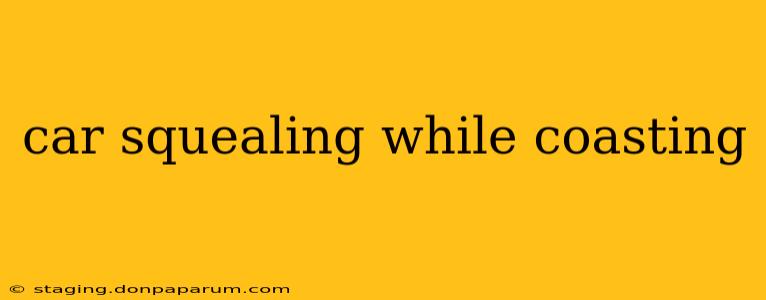A high-pitched squeal emanating from your car while coasting is definitely not a sound you want to ignore. It signals a potential problem that, if left unaddressed, could lead to more significant (and expensive) repairs down the road. This comprehensive guide will help you understand the possible causes of this unsettling noise and guide you toward a solution.
Common Causes of Squealing While Coasting
Several components in your vehicle could be responsible for that annoying squeal. Let's explore the most likely culprits:
1. Brakes
This is often the primary suspect. A squealing sound while coasting can be caused by:
- Worn brake pads: Brake pads are designed with wear indicators—small metal pieces that create a squealing noise when they rub against the rotor, signaling that your pads are nearing the end of their lifespan. This usually happens when the brakes are applied, but sometimes the squeal can persist even when coasting.
- Damaged brake rotors: Scratches, grooves, or warping of the brake rotors can also produce a squealing sound, particularly during coasting, as the pads make uneven contact.
- Stuck caliper: A brake caliper that's stuck or seizing can cause constant friction, leading to a squealing noise even when the brakes aren't engaged.
2. Belts
The serpentine belt drives various components in your engine, including the alternator, power steering pump, and air conditioning compressor. A squealing sound while coasting could indicate:
- Worn or damaged belt: A worn, cracked, or glazed belt can slip, causing a high-pitched squeal. This is more likely to occur when the engine is under load, but it can sometimes persist even while coasting.
- Belt tensioner or pulley problems: A faulty tensioner or pulley can cause the belt to slip and squeal, especially at certain speeds or engine loads. Even while coasting, a slightly loose belt can still make noise.
3. Wheel Bearings
Wheel bearings support the rotation of your wheels. A failing wheel bearing can create a variety of noises, including a high-pitched squeal that's often more noticeable at higher speeds or while coasting. This sound is typically accompanied by other symptoms, like:
- Grinding or humming noise
- Vibration in the steering wheel or affected wheel
- Play or looseness in the wheel
4. Other Potential Causes
While less common, other factors could contribute to a squealing noise while coasting:
- Power steering pump: A failing power steering pump can sometimes produce a squealing noise, although it's usually more prominent during turns or when the steering is under load.
- Alternator: Similar to the power steering pump, an alternator problem could manifest as a squeal, but this is more common under load.
Diagnosing the Source of the Squeal
Pinpointing the exact cause requires a careful inspection. Here are some steps you can take:
- Listen carefully: Try to pinpoint the location of the squeal. Is it coming from the front, rear, or a specific side of the car?
- Check brake pads and rotors: Visually inspect your brake pads and rotors for signs of wear, damage, or corrosion.
- Examine belts and pulleys: Look for any cracks, glazing, or other signs of damage on your serpentine belt. Inspect the pulleys for any signs of wear or damage.
- Check wheel bearings: Jack up the car and check for play or looseness in the wheels. Listen for unusual noises while rotating the wheels by hand.
When to Seek Professional Help
If you're unable to identify the source of the squeal or are uncomfortable performing any maintenance yourself, it's crucial to seek professional help from a qualified mechanic. Ignoring a persistent squealing noise could lead to more significant damage and potentially unsafe driving conditions. Don't hesitate to schedule an appointment to ensure your vehicle's safety and reliability.
This information is for general guidance only and should not be considered a substitute for professional automotive advice. Always consult with a qualified mechanic for diagnosis and repair of any automotive issues.

